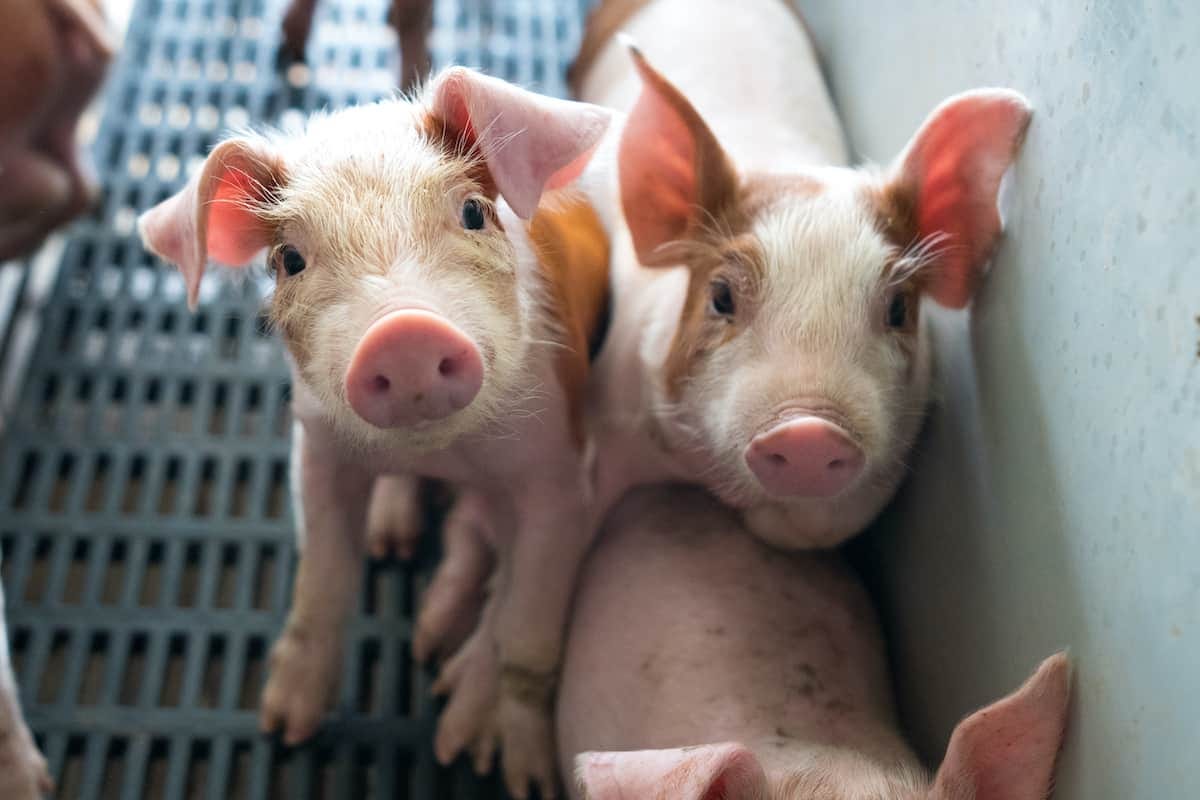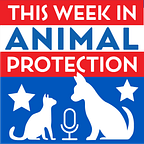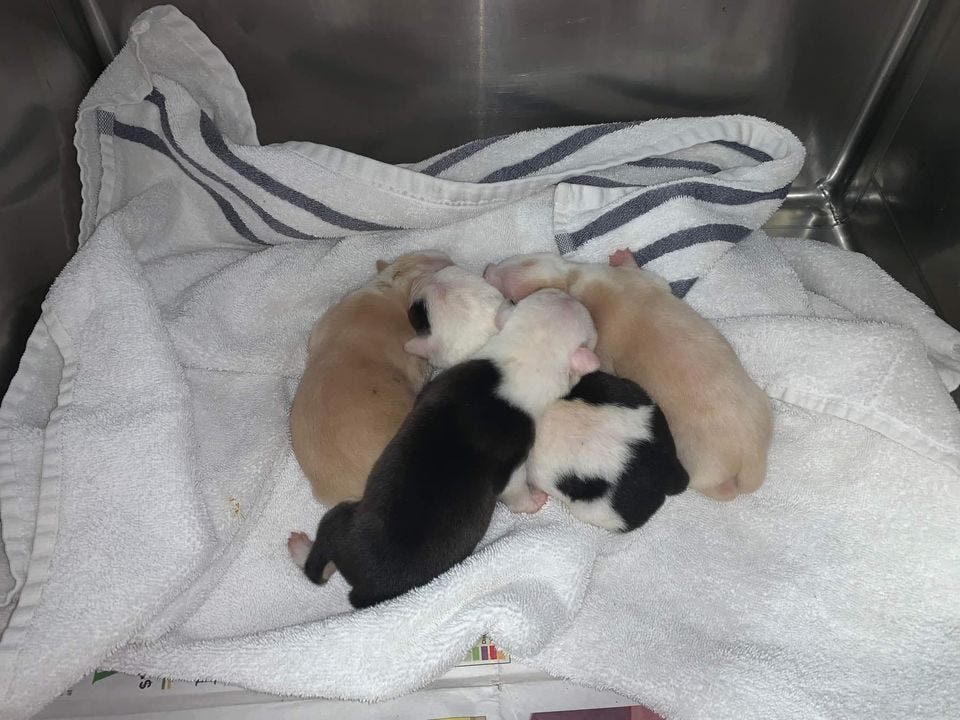
These are some of the stories making headlines in animal protection:
Subscribers can also listen to the podcast above, which includes extended commentary on many of the issues, including why temperament testing doesn’t work in shelters, why animals are set up to fail, why they get sick, and what science says shelters should be doing to keep dogs and cats happy and healthy. For those who want to skip the news and go straight to the main discussion, it begins at the 26:30 mark.
There is also a 15-minute sample of the podcast for those who have not yet subscribed but want to hear what it is like. Sample podcasts are also available on Apple, Spotify, and Google Play.
Residents of Waycross, GA, are accusing the city’s animal control of mismanagement and dereliction of duty after they killed a mother dog and her four puppies, despite pleas from networkers and rescuers who wanted to save them.
According to reports, after killing the mother for snapping (but not making contact) when staff repeatedly prodded her with a pole:
Being a Friday afternoon and employees not wanting to bother with bottle feeding puppies, the puppies were also euthanized. This was a senseless tragedy created by unchecked and uncaring employees who couldn't be bothered with extra work or following protocols because they were just there to collect a paycheck.
Rescuers had asked city officials not to kill them and arranged to pick them up. Residents are also upset because of “screenshots of text messages” from staff that appeared to be “bragging and laughing about euthanizing animals after collecting a surrender fee.” One of the staff texted, “LOL” and told others that the job entailed “surrender fee and euthanasia.” Although it is no laughing matter and shows a lack of caring, fitness, maturity, and temperament for the job, the staff member subsequently claimed she was ‘joking around’ when she said, “stick em all with a needle.”
The city is investigating itself.
The next time someone says “we all want the same thing” and “no one wants to kill,” tell them about the five dogs killed in Waycross despite rescue groups ready, willing, and able to save them.
For those who live in Georgia and want to stop this: The No Kill Advocacy Center has a model rescue rights law that would make it illegal to kill animals when qualified rescue groups are willing to place them, a step-by-step guide to getting it introduced, and NKAC attorneys stand ready to help.
As previously reported, a recent study concluded that the breed of a dog tells us how the dog looks, not how they behave. Specifically, the study concluded that “for predicting some dog behaviors, breed is essentially useless, and for most, not very good.”
For example, study authors noted that the “defining criteria of a golden retriever are its physical characteristics — the shape of its ears, the color and quality of its fur, its size — not whether it is friendly.” Likewise, the findings “would seem to cast doubt on breed stereotypes of aggressive dogs, like pit bulls.”
Now, two studies tell us what shelters should do about it: remove “breed” labels on dogs. Not only does breed not tell us how dogs behave, but shelter workers often misidentify breeds – 50% of dogs labeled “pit bulls” lacked DNA breed signatures of breeds commonly classified as pit bulls. And when it comes to dogs identified as “pit bulls,” perception of breed negatively impacts length of stay and rates of adoption. Consequently, removing these labels allows these dogs to be adopted and adopted more quickly. It also results in a better fit between the family lifestyle and the behavior of the individual dog.
Austin, TX, closed its doors to further intakes, saying it is overcrowded despite intakes well below pre-pandemic levels. Austin has been removed from the Saving 95 website that tracks open admission shelters with placement rates between 95% - 100%.
Despite this, shelter leadership refuses to fully implement the 2010 No Kill Plan, including having offsite adoptions, a robust partnership with rescue groups, and being open fully on weekends when people are off work and children are out of school and able to visit and adopt. As a result, the Austin Animal Welfare Commission passed a vote of “No Confidence” in shelter leadership earlier this year. Among the findings, the Commission determined that leadership at Austin Animal Center fails:
“To adequately manage or support lifesaving foster and volunteer programs and to engage the willing public to help”;
“To provide adequate services to help reunite or assist taxpayers with lost or found animals”;
“[T]o implement data-driven, best practices to alleviate the ongoing space crisis”;
“[T]o tell the public about or market the ‘long stay’ dogs, despite lengths of stay in excess of one year”; and,
“[T]o accept help from or collaborate with Austin animal stakeholders that could provide immediate, free help to solve the problems the shelter is facing.”
The Commission also found that shelter leadership alienates “partnership organizations, volunteers, and other stakeholders, which has contributed to shelter overcrowding and lack of volunteer support for shelter pet care and adoptions.”
Despite such failures, the shelter is one of the best-funded in the country, with a per capita spending rate of $12 per person. That’s over double the national average and 12 times the rate of how much taxpayers were spending when I achieved No Kill as a shelter director.
In other words, No Kill hasn’t failed in Austin. Austin pound leadership has made the deliberate choice to abandon it. Tragically, while No Kill in Austin deteriorates, Austin Pets Alive is seeking to import animals from other communities despite local animals being threatened and is telling shelters to close their doors to animals in need and leave dogs and cats on the streets, which is what Austin Animal Center is currently doing.
Austin’s demise should not be surprising. Austin Pets Alive’s Human Animal Support Services is a dangerous and growing trend that closes the door of the animal shelter to lost and abandoned animals. Under the APA policy, “Intakes of healthy strays and owner surrenders doesn’t exist anymore,” and there is “No kennel space for rehoming, stray hold or intake.” People who find animals are told to take them into their own homes until their families are located or leave them on the street. Because of HASS, animals are being turned away across the country, including motherless neonatal kittens. Some are being subsequently found dead.
Now Kristen Hassen, one of the chief architects of that policy and a shelter “consultant,” is making the claim that free-roaming dogs living in Mexico have better lives than American dogs living in homes: “As someone who has run shelters for nearly a decade, I truly believe our model is making dogs mentally and physically unwell.” Science contradicts her.
A literature review in Applied Animal Behaviour Science compared the life of the “typical village dog” with the “typical modern suburban or urban dog” to determine which leads to happier and healthier lives. The authors found that the life of village dogs is categorized by “lack of sufficient and adequate food, lack of veterinary care, and human hostility.” Puppy mortality is high (as much as 70%), life expectancy is low (3-4 years, on average), and female dogs face targeted killing (to prevent maternal aggression, mating, and the birth of even more pups).
By contrast,
[T]he typical modern suburban or urban companion dog experiences good welfare in a number of respects. This is especially the case when it comes to security, satisfaction of nutritional needs (though companion dogs have problems with a high prevalence of obesity), and proper veterinary care.
Their average lifespan is north of 10 years.
Of course, we can do more to make the lives of village dogs better, including veterinary care, food, and other protection. But these findings should put to bed, once and for all, any romanticization of village dog life.
Coming (again) soon!
No Kill Sheltering magazine was first published at the founding of The No Kill Advocacy Center almost two decades ago. At the time, No Kill Sheltering offered the only alternative to traditional sheltering practices that sacrificed the lives of animals to expediency, myths about the need to kill, and a failure to innovate.
It was discontinued as the number of voices championing the No Kill philosophy and the No Kill Equation multiplied. But given recent efforts to close shelter doors to animals in need and other threats to continued success, The No Kill Advocacy Center is resurrecting No Kill Sheltering. It is needed once again and will be available for all members and supporters.

As more people turn to rescue and adoption and more shelters embrace














